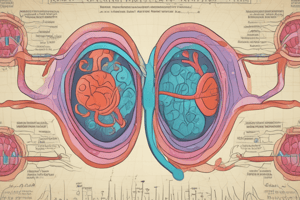Podcast
Questions and Answers
What is the main reason for testing kidney functions?
What is the main reason for testing kidney functions?
- To assess the overall health of the body
- To determine the impact of many diseases on the kidneys (correct)
- To diagnose a specific disease
- To identify damage to a specific part of the nephron
What happens to the nephron in most diseases?
What happens to the nephron in most diseases?
- The renal corpuscle is destroyed
- The entire nephron is damaged (correct)
- The loop of Henle is preserved
- Only the glomerulus is affected
Why is it crucial to monitor kidney function regularly?
Why is it crucial to monitor kidney function regularly?
- To diagnose hypertension
- To assess liver function
- To identify potential kidney damage from various diseases (correct)
- To detect kidney stones
What is a common consequence of many diseases on the kidneys?
What is a common consequence of many diseases on the kidneys?
Why are kidney function tests important in disease diagnosis?
Why are kidney function tests important in disease diagnosis?
In which age group does creatinine clearance fall slowly but progressively to about 70 ml/min?
In which age group does creatinine clearance fall slowly but progressively to about 70 ml/min?
What is the unit of measurement for creatinine concentration in urine?
What is the unit of measurement for creatinine concentration in urine?
What is the average creatinine clearance value for healthy adults between 20-40 years?
What is the average creatinine clearance value for healthy adults between 20-40 years?
What is the formula to calculate creatinine clearance?
What is the formula to calculate creatinine clearance?
Which of the following is NOT a way to measure kidney function?
Which of the following is NOT a way to measure kidney function?
What happens to glomerular function in some diseases?
What happens to glomerular function in some diseases?
Why should creatinine clearance be related to surface area in children?
Why should creatinine clearance be related to surface area in children?
What is the definition of clearance?
What is the definition of clearance?
What is the ideal test for kidney function?
What is the ideal test for kidney function?
What is the formula for calculating creatinine clearance?
What is the formula for calculating creatinine clearance?
What is the normal range of creatinine clearance for elderly individuals?
What is the normal range of creatinine clearance for elderly individuals?
What is the primary function of the nephron?
What is the primary function of the nephron?
What is the primary role of the kidneys in maintaining acid-base balance?
What is the primary role of the kidneys in maintaining acid-base balance?
What is the primary function of the kidneys in regulating blood pressure?
What is the primary function of the kidneys in regulating blood pressure?
What is the primary role of the kidneys in regulating vitamin D levels?
What is the primary role of the kidneys in regulating vitamin D levels?
Why is it important to test renal function?
Why is it important to test renal function?
What is the primary purpose of the Cockcroft-Gault Formula?
What is the primary purpose of the Cockcroft-Gault Formula?
Why is the constant K adjusted for females in the Cockcroft-Gault Formula?
Why is the constant K adjusted for females in the Cockcroft-Gault Formula?
What is the value of the constant K for males in the Cockcroft-Gault Formula?
What is the value of the constant K for males in the Cockcroft-Gault Formula?
What parameter is NOT used in the Cockcroft-Gault Formula?
What parameter is NOT used in the Cockcroft-Gault Formula?
What is the benefit of using the Cockcroft-Gault Formula?
What is the benefit of using the Cockcroft-Gault Formula?
What is the relationship between the glomerular filtration rate and the creatinine clearance?
What is the relationship between the glomerular filtration rate and the creatinine clearance?
Flashcards are hidden until you start studying
Study Notes
Renal Function Tests
- Renal function tests include serum creatinine, creatinine clearance, GFR estimation, and serum urea.
- Serum creatinine is the ideal test because it is constant, freely filtered, endogenous, and not reabsorbed (but 10% secreted).
Creatinine Clearance (GFR)
- GFR estimation formula: U x V / P
- Normal range:
- Adults: 110 ml/min
- Elderly: 70 ml/min
- Limitations: urine collection
Functional Units of Kidney: Nephron
- Each kidney contains 1,000,000 to 1,300,000 nephrons
- Nephron functions:
- Regulation: water and electrolyte balance, acid-base balance, and arterial blood pressure
- Excretion: metabolic waste products and foreign chemicals
- Hormonal: secretion of erythropoietin, activation of vitamin D, and activation of angiotensinogen
- Metabolic: gluconeogenesis
Kidney Function Tests
- Why test renal functions? Many diseases affect renal function, and destruction of complete nephron affects several functions.
- Measurements: serum creatinine, creatinine clearance, serum urea, and electrolytes
Creatinine Clearance Formula
- Clearance: the volume of plasma cleared from the substance excreted in urine per minute
- Formula: U x V / P
- U: concentration of creatinine in urine (μmol/L)
- V: volume of urine per minute
- P: concentration of creatinine in plasma (μmol/L)
Cockcroft-Gault Formula
- An alternative method to calculate creatinine clearance using parameters such as:
- Serum creatinine level
- Sex
- Weight of the subject
- K: a constant that varies with sex (1.23 for males, 1.04 for females)
Studying That Suits You
Use AI to generate personalized quizzes and flashcards to suit your learning preferences.




